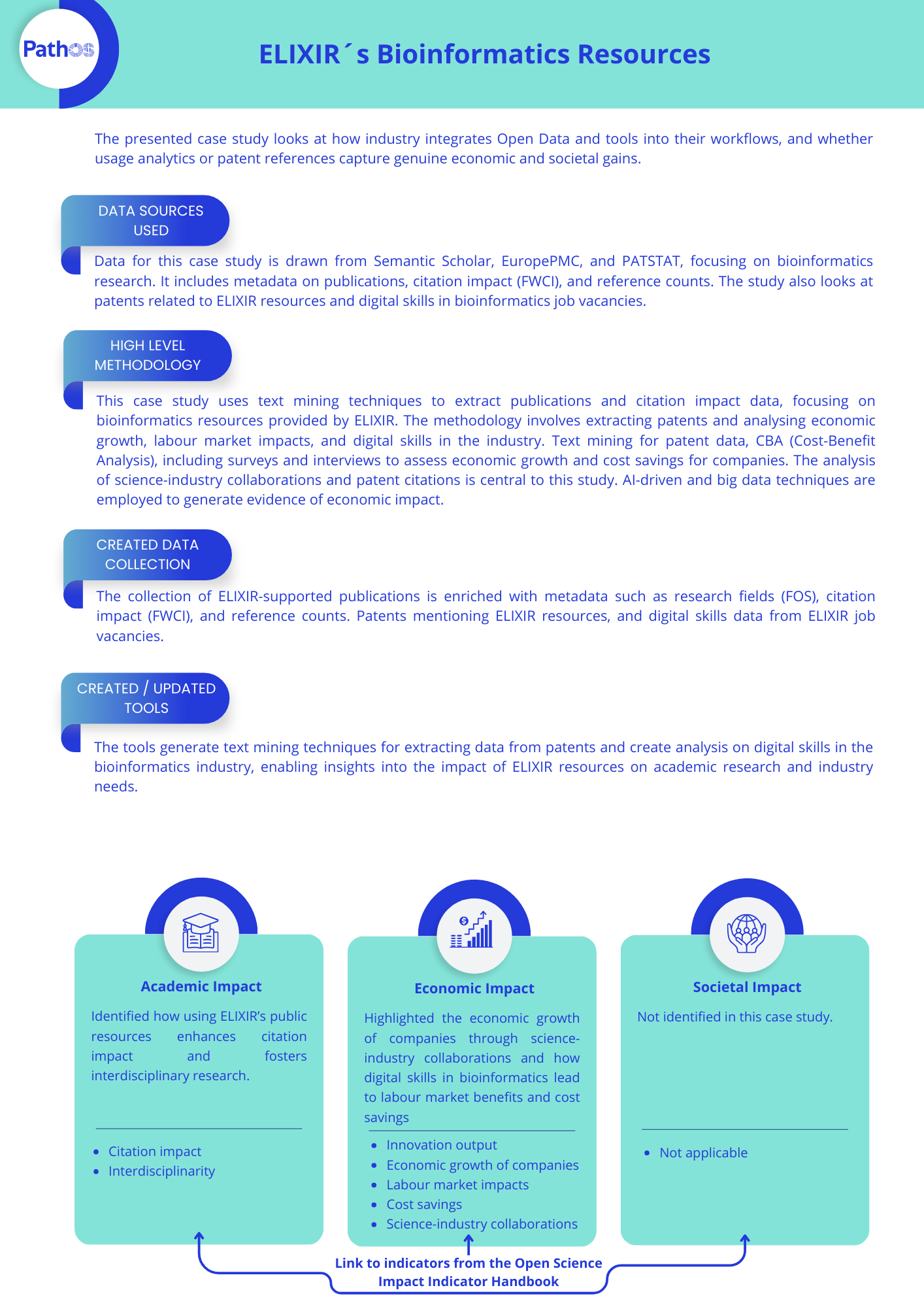ELIXIR´s Bioinformatics Resources
About This Case Study
This case study is specific to the life sciences domain and focuses on the use by industry of open bioinformatics resources made available through ELIXIR. These range from databases (e.g., molecular data, scientific literature), tools (e.g., software, workflows), cloud computing, training, and interoperability and other standards.
Previous ELIXIR-led work has shown that Small and Medium-sized Enterprises (SMEs) use public-funded open/FAIR resources (e.g. databases, software, tools, workflows, standards, ontologies, cloud computing, etc), such as that provided by ELIXIR:
- as business models (Garcia et al., 2018) and/or
- to create innovative added-value products and services that they sell to larger industry clients (Lauer et al., 2021).
The results of these studies suggest that socioeconomic and societal benefits are generated, following impact pathways. In PathOS, we aim to investigate these pathways (and underlying logic) in finer detail, including looking at causality aspects. The bioinformatics case study will hence build on and expand the previous ELIXIR-led work to unravel the whole impact pathways and shed light on:
- the effect of ELIXIR’s activities on fostering innovation in the industry sector, and
- how this then translates to identified/quantified socioeconomic and societal benefits.
In the context of PathOS, ELIXIR’s activities can be simplified as follows:
- ELIXIR provides (i.e. builds and maintains) more than 400 open/FAIR bioinformatics resources (download list as .csv) to life scientists,
- ELIXIR equips life scientists with the required technical skills (to use these resources), through ELIXIR-badged ELIXIR-badged training. For clarity, ELIXIR training is considered a type of bioinformatics resources, hence why it is included in the impact pathway logic (shown below),
- ELIXIR publishes research research articles on the development and operation of bioinformatics resources. These publications highlight ELIXIR’s scientific legacy as a research infrastructure, and their citations by others (in the open literature and in patents) demonstrate the extent of ELIXIR’s contribution and appreciation by others, and
- ELIXIR engages with the industry sector to raise awareness of ELIXIR resources, promote collaborations and sometimes co-design new resources (e.g. the FAIR Cookbook).
Usage information is available for a growing number of ELIXIR’s open bioinformatics resources. Users, however, do not typically need to register to use these resources, meaning that it is difficult to disaggregate usage information by sector (i.e., academia vs industry). The relevant evidence of socio-economic and societal impact will hence need to be collated through interviews and/or surveys of SMEs across Europe. For the complementary investigation on patents, a data-driven approach will be used using searches of literature and patent databases.
Explore PathOS Case Studies: Methods, Data, and Tools
Are you curious to learn more about how PathOS carried out its case studies? Would you like to replicate our methods, reuse our indicators, or explore the workflows behind our analyses?
You can dive deeper into our technical approach, data pipelines, and indicator implementation in the resources below:
-
Data & Tools for the Long-term Evaluation of Open Science - a reference guide supporting reusability of PathOS datasets, workflows, and computational tools for OS impact evaluation.
-
Open Science Impact Indicators for Case Studies – Final Report - insights from six case studies showing how Open Science impacts vary across disciplines, infrastructures, and national contexts.
And make sure to check out our PathOS Toolkit at GitHub!


